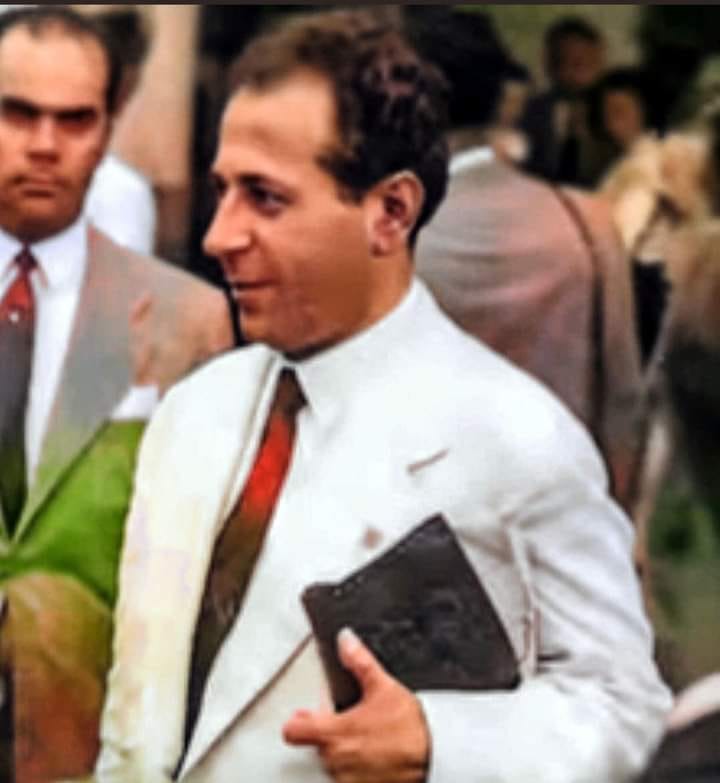Sa'adeh was indeed a great ethical leader for two main reasons. Firstly, his life was consistent with the ideals and virtues he embraced; he never exploited the moral power of his authority for personal gain but consistently demonstrated inner congruence with his belief system. Secondly, he pursued noble ends with noble means, living a life guided by principles while striving to establish a coherent truth embodied in a national doctrine that offered new principles, values, and virtues essential to the worthwhile life of his society.
Sa'adeh created a strong bond with his comrades. He built exceptional trust among them in himself and the goals he articulated by demonstrating self-confidence, self-discipline, conviction, deep knowledge, care for others, and total dedication of his time, thought, and effort to the national cause.
Sa'adeh was a courageous leader, willing to face challenges and undeniable odds and keep going. He believed that struggle is an essential part of life and that freedom cannot be attained without it. It is the determining factor between right and wrong and between good and evil. He was always willing to make difficult and courageous decisions, regardless of the prevailing winds and personal cost. He frequently engaged in personal risk-taking and self-sacrifice to create an extraordinary level of trustworthiness. His behaviour during the few hours immediately before his execution by the Lebanese authorities demonstrates exemplary levels of commitment and self-sacrifice.
Antun Sa'adeh could have avoided meeting with Husni al-Za'im and not gone to his presidential palace at the scheduled time. He could also have left the country, but he refused to take such a stance amid the battle, as he was the supreme leader of the social nationalist forces. Is it conceivable that he would flee from confrontation, being the teacher who fought against cowardice, hesitation, and submission, and called for sacrifice, struggle, and heroism? Is it conceivable that his main concern at that time was personal safety when he was the one who said, “All of life is but an honourable stance”? Hence, he refused to change his plan, abandoning his most sacred duties to ensure the life and victory of his Renaissance. As his secretary, Elias Qunayzah, stated, the Renaissance is "the only guarantee for the leader's life and the life of the entire nation... it is the only hope and the real work to achieve the sovereignty and dignity of the nation."
Sa'adeh went to the meeting despite the advice of his secretary, putting aside personal safety and taking a chance, showing concern for the cause rather than for his self-interest. However, Hosni, the traitorous agent who was involved in a conspiracy planned by the circles of some Western countries in collaboration with global Zionism and the rulers of the reactionary Arab states, broke his promise and handed Sa'adeh over to the Lebanese authorities.
After a swift and secretive trial, the military court unjustly and in breach of the basic law sentenced Sa'adeh to death by firing squad.[1] The Lawyer appointed to defend Sa’adeh was not given enough time to acquaint himself with the case or to prepare his defence. He resigned in disgust. Just minutes before his execution at dawn on the 8th of July, this historic hero uttered the following words: “I am not concerned about how I die, but rather about what I die for. All of us die, but few among us have the honour of dying for a belief... Tonight they will execute me, but the believers in my doctrine will triumph. Their victory will be revenge for my death."[2] As told by Said Taki al-Din in his famous interview with the priest who confessed Sa'adeh before his execution, Sa'adeh walked to his death “with strong, quiet steps and a smile, composed as though the execution was something he had undergone many times before. He did not burst out into hatred, vengefulness, or bluster like someone hiding fear.”[3]
After twelve bullets pierced Sa'adeh's chest while he repeated the word "thank you," his body fell lifeless on the shores of Beirut. However, his blood triumphed over death with the will to live, embodying pride, resistance, and vigour. The foolish mercenary criminals who assassinated Sa'adeh to destroy his cultural renaissance project fell into the trash heap of history and vanished into oblivion as if they had never existed. Sa'adeh continued to live on eternally in the conscience and hearts of Syrians, through his honourable stances and radiant legacy, immortal works and eloquent words, and brilliant truths as bright as the sun. He became a living idea that never dies... He became a spirit that permeates souls and sprouts each day and, in every place, “ears of wheat” of goodness, love, and generosity... producing free men and women, and resistors... armed with lofty teachings and carrying them as torches of light that dispel the darkness of the nation and fill the world with light, beauty, and radiance.
[1] For a detailed study of this trial, see Adel Beshara. Outright Assassination: The Trial and Execution of Antun Sa’adeh, 1949, UK: Ithaca Press, 2010.
[2] Said Taky al-Din, “The Priest who confessed him”, in Adel Beshara, Syrian Nationalism: An Inquiry into the Political Thought of Anun Sa’adeh. Beirut: Dar Bissan, 1995, Appendix 5.
[3] Ibid.

